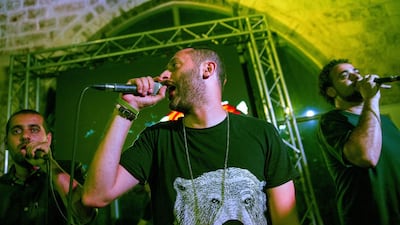“In Israel, they look at me as a Palestinian,” says Tamer Nafar. “And in the Arab world, they look at me as an Israeli.”
Less dual identity than personal and career dilemma, that is the situation faced by the Palestinian rapper and his group, DAM, which also includes his brother Suhell Nafar and Mahmoud Jreri. Fittingly, DAM stands for both “eternity” in Arabic and “blood” in Hebrew… or just Da Arabian MCs in hip-hop parlance.
“I’m a Palestinian living in Israel,” he says. “When you land, you have Ben Gurion Airport. That’s three minutes from my house. When it was part of Palestine, we used to call it Lydda.”
Nafar was at home recovering from a throat virus, but still enjoying a hookah and drink while his bandmates were on tour in Tokyo. This Palestinian rap group, who toured the United Kingdom last month, have a very impressive international profile.
Formed in 1999, with two albums – Ihda' (2006) and Dabke on the Moon (2012), DAM tour 50 countries a year and have since 2003. They've toured the UK dozens of times and all five Japanese shows were sold out.
“It’s beyond politics,” he exclaims. “It’s charisma. We are entertainers, after all.”
But it’s not entirely beyond politics – nor could it be.
Nafar has an Israeli passport “but we consider ourselves Palestinians – not as a clichéd political statement, but as a righteous statement”. As a rapper, he was initially inspired by the American legend Tupac Shakur (who was murdered in 1996). “I was listening to hip-hop before; remember that song by Snap!, I Got the Power? But Tupac – something about the charisma and the energy. I didn’t understand a word of it at first. He was the one who made me write out lyrics and search out meanings in the dictionary.”
He and DAM first rapped in English, then in Hebrew “because of the flow of the words”.
“Back then, I wanted to do it in Arabic, but there was nobody to inspire me. It’s about the flow, the rhymes, the syllables. So Arabic took time to develop. But I would say that music, even if it’s not in English, is an international language.”
That brings us to the international audience.
The UK tour hit Sheffield, Manchester and London and was a roaring success. Le Monde has hailed them as "spokesmen of a new generation". But when they tour London, or Tokyo, or Paris or Madrid, who is in the crowd?
“You have Arabs, you have pro-Palestinian activists and you have hip-hop fans,” Nafar says.
Does the audience know what’s going on?
“First of all, we have animation and artwork behind us. Second, there is the beat. Third, we speak a lot between songs. We explain things, they laugh. And to restate that the crowd, the hip-hop audience, is united beyond politics.”
But back home, politics is ever-present.
Their 2002 breakthrough single, Meen Erhabi? (Who Is the Terrorist?), addressed Israelis throwing stones at a Yafa mosque in response to a suicide bombing. Nafar was also the co-subject of the 2003 documentary Channels of Rage. Shot by the Israeli filmmaker Anat Halachmi, the film followed Nafar and a right-wing Zionist rapper, Kohi Shimoni, as they sparred on- and offstage for three years. Nafar self-identifies as politicised and progressive. "When I speak about the occupation, the Israelis find me radical. And when I speak about women's rights and gay rights, Arabs find me radical as well." He is an atheist, but one "who's saving money to send my mum to Mecca on the Haj".
“I started rapping because I wanted to make a change,” he says. “Then I realised it was just me going through changes. Now it’s more like reflecting the reality around us.”
And the mood of late has not been good. “When we started in Hebrew, the audience was mostly Jews. But with every war and every attack… Jews cannot accept me mostly anymore. And I have a lot of Arabic friends who say: ‘I’m not political, I just wanna do love songs’ and they’re not being accepted either.”
Unsurprisingly, he reports that in the wake of this past summer’s Gaza operation, which left more than 2,100 dead, there is a big gap between the Palestinians in Israel and the Israelis. “Even if you go on YouTube now, and there’s an Arabic song – nothing political – the comments will all be ugly.
“ This country is not my country and it’s so racist. I’m not being played on the radio, I don’t have a local label and I’m not invited to festivals.
“I have many fans in Lebanon, but I can’t go there,” he says. “I can’t go to Arab countries.” No Gaza, no West Bank – “although things are lighter in the West Bank. It’s illegal for me to go there, but there are ways”.
Is this the low point in relations? “It would be scary to imagine there could be a lower one,” Nafar says.
“Rhymes will not solve it. We just document it,” he says, with less resignation than the statement implies. “But I think the first step is for the Israelis to admit that they took the land from the natives. Second step is to apologise for all the massacres. After that, when they speak to us, not from above us, I think it would be easier to find a solution together.”

